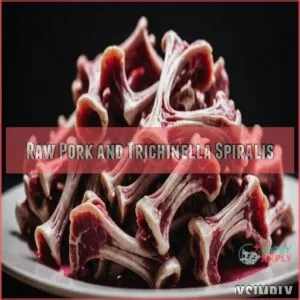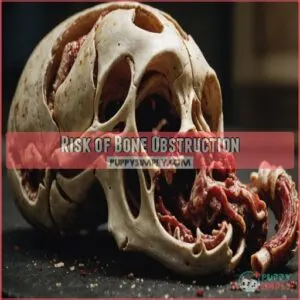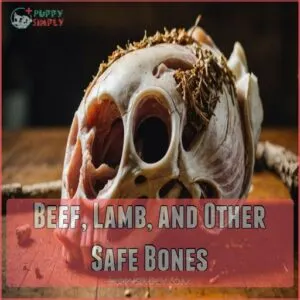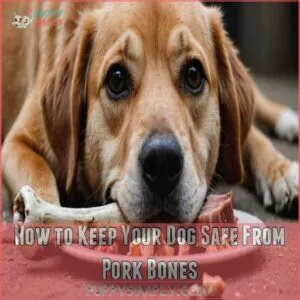This site is supported by our readers. We may earn a commission, at no cost to you, if you purchase through links.
 Can dogs eat pork shoulder bones? Not really. Cooked pork bones can splinter like a twig, posing a choking hazard and potentially harming your pup’s insides. Even raw bones aren’t foolproof—they can break apart and cause trouble. You’d hate to see your furry friend in distress! Better safe than sorry, right?
Can dogs eat pork shoulder bones? Not really. Cooked pork bones can splinter like a twig, posing a choking hazard and potentially harming your pup’s insides. Even raw bones aren’t foolproof—they can break apart and cause trouble. You’d hate to see your furry friend in distress! Better safe than sorry, right?
Opt for alternatives like dental chews or raw, non-weight-bearing bones, which are safer for satisfying your dog’s chewing instincts. Keep an eye on your dog during chew time and make sure your trash is secure to prevent accidental munching.
Curious about safer options for your dog? Read on!
Table Of Contents
- Key Takeaways
- Risks of Feeding Pork Shoulder Bones
- Why Pork Shoulder Bones Are Not Safe for Dogs
- Safe Alternatives to Pork Shoulder Bones
- What to Do if Your Dog Eats a Pork Bone
- Signs of Bone Ingestion Problems in Dogs
- How to Keep Your Dog Safe From Pork Bones
- Frequently Asked Questions (FAQs)
- Are pork shoulder bones safe for dogs?
- Can dogs eat pork bones?
- Can dogs eat pork ribs?
- Are pork butt bones safe for dogs to eat?
- Can a dog eat a cooked pork shoulder bone?
- Which bones can dogs eat?
- Do pork bones dissolve in a dog’s stomach?
- How to prepare pork bones for dogs?
- Are pork rib bones safer than shoulder bones?
- Can cooked pork bones be given to dogs?
- What about marrow bones from pork?
- Are all pork bones equally dangerous?
- My dog loves pork, are there safe treats?
- Conclusion
Key Takeaways
- Don’t give your dog pork shoulder bones—cooked or raw—as they can splinter and cause choking or serious internal injuries.
- When it comes to giving bones to your dog, consider the fact that even lamb bones can pose hidden dangers like gastrointestinal obstruction and tooth fractures if not chosen carefully, as explained in more depth about lamb bone safety. Opt for safer chew alternatives like dental chews or raw, non-weight-bearing beef and lamb bones to satisfy your dog’s chewing instincts.
- Always supervise your dog during chew time and ensure your trash is secure to prevent accidental ingestion of dangerous bones.
- If your dog eats a pork bone, check for splinters, clean up any fragments, and contact your vet immediately for advice.
Risks of Feeding Pork Shoulder Bones
Giving your dog pork shoulder bones can be risky business.
Those bones are prone to splintering, which could lead to painful injuries or even a trip to the vet, so it’s best to choose safer chew options.
Splintering and Choking Hazards
Pork shoulder bones can be sneaky troublemakers for dogs, leading to splinters and choking hazards. Here’s why they’re risky:
- Bone safety: Cooked bones splinter easily.
- Dog choking: Small pieces get lodged.
- Pork shoulder bones: More prone to breaking.
- Bone splinter damage: Causes internal injuries.
- Safe alternatives: Opt for raw beef bones instead.
Keep it safe and opt for alternatives.
Digestive Blockages
Handing your dog a bone without a second thought can lead to digestive blockages, clogging their system like a traffic jam during rush hour.
These blockages—caused by bone size or sharp edges—can stop things from moving along smoothly in their digestive tract.
Consider opting for durable chew toys for dogs instead of bones to reduce the risk.
Keep an eye out for symptoms like vomiting or changes in appetite.
Prevention lies in choosing safer chew options.
Intestinal Perforations
Symptoms of intestinal blockages aren’t fun, but the real threat is perforations.
Imagine a bone shard turning into a tiny spear inside your furry friend. It can puncture the intestine, causing severe pain and possible infection.
Larger breeds may be more at risk.
Prompt surgery might be necessary.
For dog bone safety, it’s also important to be aware of the risks associated with other types of bones, such as lamb bone ingestion risks. prevention tips include avoiding pork bones entirely.
Why Pork Shoulder Bones Are Not Safe for Dogs
You might think a pork shoulder bone would make a tasty treat for your dog, but these bones can actually spell trouble.
They’re notorious for splintering and causing dangerous obstructions, putting your furry friend at serious risk.
Raw Pork and Trichinella Spiralis
Thinking of giving your dog raw pork shoulder bones. However, it’s essential to remember that even if you’re considering raw bones, you should still avoid giving your dog cooked lamb bones splinters, and always supervise their chewing? Hold up! Raw pork can host trichinella spiralis, a sneaky parasite that’s no friend to your pup.
Protect them by:
- Ensuring pork is cooked thoroughly
- Avoiding raw pork bones
- Consulting your vet for dog-safe treats
- Keeping raw meat out of reach
Keep your furry pal parasite-free!
Risk of Bone Obstruction
Pork shoulder bones might seem tempting, but they’re risky for dogs.
Cooked bones, like pork shoulder bones, can easily break into shards, a common issue with pork chop bone risks.
Imagine trying to swallow a bowling ball—this is like what dogs face with these bones.
Their size and shape can cause bowel obstruction, blocking the digestive tract and leading to serious health problems.
Always choose dog bone alternatives that match your dog’s size, age, and breed for safer chewing.
Danger of Bone Splinters
Bone obstruction’s a serious problem, but bone splinters are equally dangerous. They’re tiny, sharp pieces that can cause big trouble.
- Bone splinters can puncture your dog’s intestines.
- Internal bleeding is a real risk.
- Look for diarrhea or changes in appetite.
- Abdominal pain is another warning sign.
- Get immediate vet help if you suspect a problem. Prevention’s key!
Safe Alternatives to Pork Shoulder Bones
When you’re searching for safe alternatives to pork shoulder bones for your dog, consider options like dental chews and toys or raw, non-weight-bearing bones.
Beef and lamb bones are also great choices, offering both safety and mental stimulation.
Dental Chews and Toys
Swapping pork shoulder bones for dental chews and toys can keep your pup’s pearly whites intact.
Good chew toys do wonders for dental health and don’t splinter.
Imagine this: your dog munching happily, no worrying about shards!
Some dental chews, like best dental chews for dogs, pack a bigger punch for your pup’s oral health.
Check out the table below for a quick peek at options.
| Toy | Pros | Cons |
|---|---|---|
| Rubber Chew | Durable | Can be costly |
| Nylon Bone | Promotes clean teeth | Tough on gums |
| Rope Toy | Fun for fetch | Frays over time |
| Treat Dispenser | Engaging, rewarding | More pricey |
| Plush Chew | Soft on teeth | Tears easily |
Raw, Non-Weight-Bearing Bones
Ever watched your pup gnaw on something like they’re starring in a nature documentary?
That’s where raw, non-weight-bearing bones come in.
You can find a variety of these bones at online stores selling Raw dog bones.
They’re a safer choice compared to pork shoulder bones, reducing the risk of splinters while satisfying those chewing instincts.
These bones help clean teeth and provide hours of mental stimulation—just supervision is key in avoiding bone marrow risks!
Beef, Lamb, and Other Safe Bones
Choosing beef or lamb bones for your pup is like picking the right dance partner—one that doesn’t step on toes.
Beef knuckle bones or large raw lamb bones are excellent, safer choices.
These dog-safe bones satisfy chewing instincts and clean teeth.
Always pick bones matching your dog’s size, balancing the need for control and safety.
What to Do if Your Dog Eats a Pork Bone
If your dog manages to snag a pork bone, don’t panic—take immediate action by checking the situation and following some important steps.
Acting quickly can help prevent any serious health issues, making sure your furry friend stays safe and happy.
Step 1: Examine Your Dog
Spotting your dog with a pork shoulder bone is worrisome.
First off, check for splinters in their mouth—think of it as playing detective.
If you suspect a dog bone splinter, consider a preventative measure like bone splinter products.
Observe for choking or any odd sounds while they’re breathing.
This isn’t just a sniff test; assess their comfort and check for vomiting.
Ensuring they’re in good shape is your top priority now.
Step 2: Clean Up
Next, thoroughly clean up any remaining bone fragments.
Safe disposal is key!
Use gloves to pick up any pieces you can find.
Proper trash removal prevents further accidents.
Make sure your dog’s environment is bone-free.
These cleanup tips will help keep your furry friend safe.
Remember, cooked pork bones are especially dangerous, so be extra careful.
Step 3: Call Your Vet
When your dog chows down on a pork shoulder bone, it’s time to ring the vet.
This is no time for guesswork—it’s a critical moment for urgent care.
Bone ingestion can lead to tummy trouble or worse.
A quick call provides essential advice on dog safety and any steps for urgent veterinary care.
Keep your furry friend healthy and happy.
Step 4: Don’t Force Vomiting
If your curious pup has munched on a pork bone, don’t rush to make them throw up.
Forcing vomiting can sometimes cause more harm than good.
Instead, keep your cool and dial your vet for advice.
They’re your go-to for figuring out the next best steps.
Remember, safety first with our furry companions—vet advice is golden!
Step 5: Watch for Changes
Keep a watchful eye on your furry friend after they’ve nabbed a pork bone.
Look for changes in behavior, such as shifts in appetite or stool changes.
Vomiting signs and dips in energy levels can also indicate digestive problems or internal bleeding.
These changes might lead to veterinary emergencies, so reach out to your vet if anything seems off.
Signs of Bone Ingestion Problems in Dogs
If your furry friend occasionally sneaks a bone, you’ll want to know the early signs of trouble.
Watch for symptoms like vomiting, diarrhea, or that odd tummy bloating—spotting these early can help you act fast and keep your pup safe.
Vomiting and Diarrhea
Spotting vomiting and diarrhea in your pup after chowing down on suspicious bones can be a real wake-up call.
These telltale signs often scream digestive problems, showing your dog’s system isn’t having it.
You might need to play doctor for a day, but remember, sometimes home remedies aren’t enough.
Cooked lamb shank bones, like other cooked bones that splinter easily, pose severe risks to dogs. Don’t let this be guesswork—pork bone risks for dogs are serious business.
Loss of Appetite
Nobody likes to skip a meal, and neither does your dog.
A loss of appetite could be a red flag pointing to issues with that risky pork bone your furry friend munched on.
Appetite changes might signal pork bone digestion problems or even an allergic reaction.
Keep an eye on Fido, and don’t hesitate to call the vet for peace of mind.
Lethargy and Pain
A loss of appetite is a red flag, but lethargy and pain are even bigger clues something’s wrong, especially since even raw pork bones can be risky if swallowed.
Your pup might seem unusually tired or whine when you touch their tummy.
These are big symptoms of bone ingestion, especially if they ate a pork bone.
Don’t wait! A vet visit is the next step.
Abdominal Bloating
When Fido’s belly starts looking like a blow-up balloon after munching on pork bones, it’s a red flag.
Abdominal bloating can be a symptom of bone ingestion issues, especially with those sneaky, splintery pork bones.
If he’s uncomfortable or looks like he swallowed a beach ball, it’s time to call the vet.
Prevention is key; ditch those bones!
How to Keep Your Dog Safe From Pork Bones
To keep your dog safe from pork bones, always supervise them while they’re chewing.
Make sure to choose the right size and type of bone.
Keep trash cans secure to prevent any sneaky snacks.
Supervision During Chewing
Watching your dog like a hawk while they chew bones can prevent risky situations.
Chewing safety’s no joke—those pork bone dangers are real.
Keep an eye out and intervene if needed, ensuring they stick to dog safe bones.
Supervision during chewing isn’t just about safety; it’s about teaching good dog behavior.
Rottweilers can experience severe health risks from chewing on bones, especially cooked bones which can splinter and cause mouth injuries, leading to infection or even death Rottweilers chewing bones. Swap questionable bones for safe chew toys when in doubt.
Proper Bone Size and Type
Picking the right bone for your pup isn’t just a guessing game.
Keep these four tips in mind:
- Bone Thickness: The thicker, the better for those chewers with strong jaws.
- Chew Strength: Match the bone to your dog’s bite power.
- Dog Breed: Larger breeds need more robust bones.
- Bone Length and Shape: Avoid bones that can easily lodge in throats.
Securing Trash Cans and Leftovers
Picture your dog as a curious detective poking around your trash can for tasty clues.
To keep them safe, make sure trash bins are dog-proof.
Stow leftovers in airtight containers, far out of reach.
Dogs don’t know what’s safe—they just follow their noses!
Protect them from risky pork shoulder bones by managing kitchen safety and avoiding toxic foods.
Frequently Asked Questions (FAQs)
Are pork shoulder bones safe for dogs?
You might think pork shoulder bones are a treat, but they’re risky for dogs.
These bones can easily splinter, causing serious injuries or choking.
Stick to safer alternatives like beef or lamb bones to keep your pup safe.
Can dogs eat pork bones?
Better safe than sorry: pork bones, especially when cooked, can splinter and harm your dog’s digestive system.
It’s best to avoid them altogether.
Stick to safer alternatives like large raw beef or lamb bones under supervision.
Can dogs eat pork ribs?
Pork ribs are a no-go for dogs.
They splinter easily, leading to serious complications like choking or internal injuries.
Stick to safer alternatives, like large, raw beef bones or specially designed chew toys to keep your pup happy.
Are pork butt bones safe for dogs to eat?
Did you know 34% of dog owners worry about bone safety?
Eating pork butt bones isn’t safe for dogs; cooked pork chop bones can also cause harm, as they offer no nutritional value for dogs and can lead to digestive problems. They can splinter, causing harm.
Instead, choose safer chew alternatives like large, raw beef bones or synthetic options.
Can a dog eat a cooked pork shoulder bone?
Cooked pork shoulder bones aren’t safe for dogs.
They can splinter easily and pose a risk of choking or digestive tract damage.
Stick to safer alternatives like beef bones or vet-recommended chews to keep your dog healthy.
Which bones can dogs eat?
If you’re looking for bones for your dog, stick with large raw beef or lamb bones—they’re safer and less likely to splinter.
Avoid chicken, turkey, and pork bones as they can break into dangerous shards.
Do pork bones dissolve in a dog’s stomach?
Nope, pork bones don’t magically vanish! They’re a big no-no for your pup. Those splinters are trouble. Stick to safer options like beef bones – your dog’s tummy will thank you.
How to prepare pork bones for dogs?
You shouldn’t give pork bones to dogs.
If you’re making bone broth, simmer pork bones for 24 hours to remove any potential risks.
Always consult your vet for safe dog bone options, ensuring your pet’s health.
Are pork rib bones safer than shoulder bones?
Pork rib bones aren’t any safer than shoulder bones for dogs.
Both can splinter, posing serious risks like intestinal damage or choking.
Avoid giving your dog pork bones altogether—look for safer chewing options instead.
Can cooked pork bones be given to dogs?
Imagine Fido eyeing that tantalizing roast pork bone.
Sure, it seems like a treat, but cooked pork bones can easily splinter, causing painful injuries for your dog.
Stick to safer alternatives like beef bones for peace of mind.
What about marrow bones from pork?
Marrow bones from pork aren’t safe for dogs because they can splinter.
These splinters might cause internal injuries, just like trying to chew on a brittle twig.
Stick to safer alternatives like beef bones for your pup.
Are all pork bones equally dangerous?
Not all pork bones are equally dangerous, but they’re all risky for dogs.
Whether raw or cooked, they can splinter easily, causing serious injuries.
Opt for safer alternatives like beef bones or sturdy chew toys instead.
My dog loves pork, are there safe treats?
Does your dog love pork?
Try safer treats like beef knuckle bones or knee caps, which are softer and less likely to splinter.
You can also explore tasty options like dog-specific charcuterie or freeze-dried pork liver treats.
Conclusion
Remember Fido’s near-disaster with that chicken bone? Let’s avoid a repeat!
So, can dogs eat pork shoulder bones? Absolutely not. Those splinters are a serious threat.
Stick to safer chews; your vet can advise on appropriate alternatives.
Providing safe chews is essential for your dog’s health and happiness. Think dental chews or tough, non-weight-bearing bones. Always supervise chewing time.
By choosing wisely and staying vigilant, you’ll keep your furry friend safe and happy.
Preventing problems is always better than dealing with them.
















